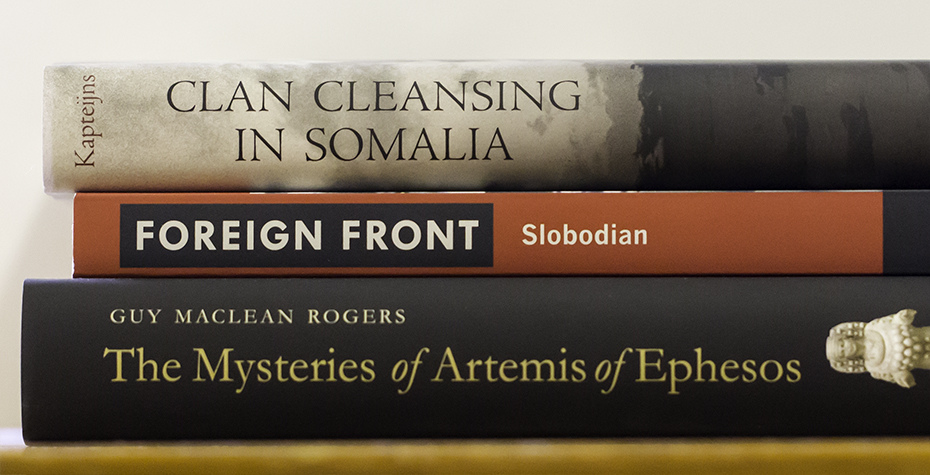Cults in Antiquity, European Social Protests, Somalian Genocide Explored in New Books by History Faculty

Three recently-published books by members of the Wellesley History faculty provide new perspectives on social changes in diverse periods and geographical areas from cults in antiquity, to European social protests, to Somalian genocide.
Clan Cleansing in Somalia: The Ruinous Legacy of 1991 (University of Pennsylvania Press, 2013) by Lidwien Kapteijns, Elizabeth Kimball Kendall and Elisabeth Hodder Professor of History, reflects on the relationship between history, truth, and post-conflict reconstruction in Somalia.
“Writing about violence, and especially violence that is unbewältigt or undigested and still largely unspeakable in shared Somali public space has been the most challenging intellectual work I have ever done,” Kapteijns said.
Kapteijns documents the organization and intent behind the campaign of clan cleansing, and traces the emergence of the hate narratives and code words that came to serve as rationales and triggers for the violence. She insists that it was not clans that killed, but people who killed in the name of the clan. She argues that public acknowledgment of the ruinous turn to communal violence is indispensable to social and moral repair and can provide a gateway for the critical memory work required of Somalis on all sides of this multifaceted conflict.
In his book, The Mysteries of Artemis of Ephesos: Cult, Polis, and Change in the Graeco-Roman World (Yale University Press, 2012) classicist Guy M. Rogers, Mildred Lane Kemper Professor of History and Classical Studies, sets the evidence for the rites and rituals of the goddess Artemis against the background of the remarkable urban development of Ephesos during the Roman Empire. Rogers proposes a new theory about the secret rites and revelations of the cult religion, which helps explain not only the success of Artemis’s cult and of polytheism itself, but also the demise of both and the success of Christianity.
“The secret that apparently drew countless thousands of people to celebrate Artemis' mysteries in ancient Ephesos over hundreds of years was the idea that human beings are dependent upon gods and goddesses for salvation,” Rogers said. “But the gods need us to achieve their goals too. This secret of human and divine reciprocity helps to explain why, for most of literate human history, the vast majority of people for whom we have any evidence whatsoever were polytheists.”
Rogers’ study of cultic change and the history of polytheism bears implications for the fields of anthropology, evolutionary psychology, and neuroscience, as well for historians
In his first book, Foreign Front: Third World Politics in Sixties West Germany (Duke University Press, 2012), German historian Quinn Slobodian, Assistant Professor of History, challenges the assertion that West German New Leftists “discovered the Third World” in the pivotal decade of the 1960s. Slobodian focuses instead on the influence of international students who were studying in West Germany during that period.
Slobodian argues that students from Africa, Asia and Latin America mobilized West German youth in protest against acts of state violence and injustice perpetrated beyond Europe and North America. This mobilization influenced later protests by young West Germans against the Vietnam War and played a significant role in forming a more nuanced German understanding of the Third World.
“The book's method reflects a general approach I bring to the study and teaching of history, asking why we tell the stories we do about the past, whose voices and experiences are lost, and what small efforts we can make to make sense of and even reverse these silences,” Slobodian said.
Update, February 7, 2013: Wellesley History faculty member Nikhil Rao, Associate Professor of History, and a Scholar of urban history and urban economic and political development in South Asia, also has a new book forthcoming. In "House, but No Garden: Apartment Living in Bombay's Suburbs, 1898-1964" (University of Minnesota Press, 2012), Rao looks at the shift from the development of colonial Bombay to sprawling contemporary Mumbai, considering the emergence of the first suburbs, their distinctive pattern of apartment living, and the significance for South Asian urban life. See all of the History Department's Recent Faculty Publications.
All four books are also available through Amazon.com:
Clan Cleansing in Somalia: The Ruinous Legacy of 1991 (Pennsylvania Studies in Human Rights) by Lidwien Kapteijns, University of Pennsylvania Press (2013)
The Mysteries of Artemis of Ephesos: Cult, Polis, and Change in the Graeco-Roman World by Guy Maclean Rogers, Yale University Press (2012)
Foreign Front: Third World Politics in Sixties West Germany (Radical Perspectives) by Quinn Slobodian, Duke University Press (2012)
House, but No Garden: Apartment Living in Bombay's Suburbs, 1898-1964 by Nikhil Rao, University of Minnesota Press (2012)
